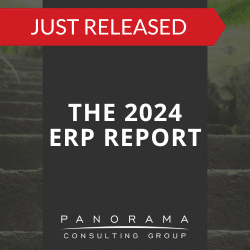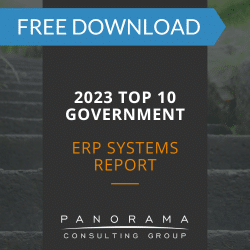If you’ve followed our blog for any significant period of time, you have probably picked up on the fact that we view ERP implementations as business initiatives rather than software or technology projects. While this concept may sound esoteric on the surface, it becomes very real when companies experience ERP failures or see their implementations negatively impact their financial results. For example, recent years have seen high-profile failures from companies such as Lumber Liquidators and Shane Company – both of which publicly stated in their quarterly financial statements that their ERP implementation woes had adversely impacted their results.
Just this week, the aerospace division of Woodward made a similar statement in its initial financial results. In the statement, the organization revealed that its revenue and profit for its fiscal third quarter would fall short of expectations, largely because of ERP implementation challenges that the company was facing. According to Woodward’s 2011 annual report, the organization had recognized $13.5 million in ERP implementation costs in that single fiscal year, not including costs that had been incurred in the first three quarters of the current fiscal year. These costs are significant for an organization with nearly $500 million in annual revenue, especially given the fact that the implementation appears to be struggling.
Woodward is not a client of ours, and I know very little about the company or which specific ERP software it is trying to implement, but our recent Clash of the Titans report shows that the leading ERP vendors – SAP, Oracle and Microsoft Dynamics – all typically take longer and cost more than expected and fail to deliver expected business benefits. Given our research and experience with ERP implementations and our work as expert witnesses in ERP lawsuits, these problems aren’t unique to Woodward or even to the three leading ERP vendors. Most ERP implementations fail — although only a subset are publicly announced. Instead, ERP implementations face challenges that affect the bottom lines of organizations every day without the corresponding publicity that comes with an announcement such as that from Woodward.
Below are three ways that ERP implementations affect the bottom lines of organizations that fail to implement properly:
- ERP implementations consume too much time and money. This is a two-fold problem. On the one-hand, companies frequently mismanage their projects or hire ERP consultants that are software experts but aren’t good project managers, which results in project overruns. On the other hand, companies more often than not grossly underestimate the time and money required to effectively implement their ERP systems. Both variables lead organizations to go over their pre-defined budgets, which ultimately affect the bottom-line results expected by management and shareholders. Based on experience, $13.5 million in ERP implementation costs does not seem completely out of line for a $500 million company (the average company spends approximately five-percent of their annual revenue on their ERP initiatives), but it is out of line if management and shareholders expect a much lower number.
- ERP projects disrupt operations. Most organizations don’t have the appropriate internal expertise or bandwidth to handle the complexities and risks of an ERP implementation, so the do-it-yourself mentality of many organizations typically leads to operational disruptions during the initiative. In addition, organizations often rush their implementations to completion, leading to operational disruptions at the time of go-live. For example, our research shows that 54-percent of all ERP implementations result in a material operational disruption at the time of go-live (e.g., the inability to ship product or close the books). Obviously, these common pitfalls have wide-ranging repercussions on the bottom lines of organizations.
- ERP implementations are harder than you think. The bottom line for most organizations is that their ERP implementations are harder than they think. This is true for a number of reasons. For example, ERP vendor sales reps and systems integrators downplay the cost, risk, and complexity of the implementations, while many companies are overly confident in their own abilities to manage the implementations. Whatever the root cause, chances are that your ERP implementation will be more difficult than you think – a statement that is backed by various studies (including our 2012 ERP Report) showing that most ERP implementations go over budget. Even though Panorama has managed close to 100 ERP implementations and our team has literally thousands of implementations under its collective belt, we still find these projects to be challenging.
The good news is that not all ERP implementations are doomed to fail or adversely affect the bottom line. When implemented effectively, ERP systems do what they are capable of doing, which is decrease costs, increase revenue, and positively affect the bottom line. However, companies need to know what they don’t know and lean on implementation experts that will not only make the technical aspects of the project successful, but also will address the more critical and more commonly overlooked aspects of ERP projects, such as organizational change management, project management and business process reengineering.
Read more about Panorama’s ERP implementation service offerings or contact us today to talk about how we can help your company realize ERP success.













